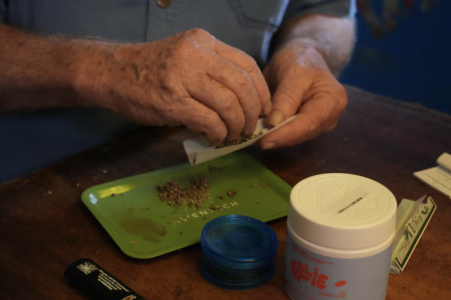AHPRA takes action against more than 50 practitioners in medicinal cannabis crackdown
By
ABC News
- Replies 0

The Australian Health Practitioner Regulation Agency CEO, Justin Untersteiner, says the regulator held serious concerns for patient safety. Image source: ABC News.
The health-practitioner watchdog has put medicinal cannabis prescribers on notice, saying poor prescribing practices and surging consumer demand are leading to "significant" patient harm.
AHPRA today released new guidelines urging prescribers to put patient wellbeing above profits, as medicinal cannabis prescriptions rise rapidly due to telehealth companies providing a one-stop shop for quick access to medicinal cannabis.
The regulator said some businesses were using "aggressive and sometimes misleading advertising that targets vulnerable people" and online questionnaires that coached patients to say "the right thing" to justify prescribing.
The ABC can reveal AHPRA has now taken action against 57 medical practitioners, pharmacists and nurses over medicinal cannabis prescribing practices.

More Australians are accessing medicinal cannabis for conditions such as insomnia, chronic pain and anxiety. Image source: ABC News/Emily Jane Smith.
"We're currently investigating a further 60 right now as we speak. And for those that choose not to meet our requirements, we will be knocking on their door in the near future," AHPRA chief executive Justin Untersteiner said.
The crackdown comes after a series of ABC investigations revealed patients with a history of psychosis had been hospitalised after being prescribed medicinal cannabis and one patient had died following inappropriate prescribing.
The investigations also revealed concerns from doctors who said they were being treated like drug dealers and pressured to write medicinal cannabis scripts by the telehealth companies.
While AHPRA said the majority of practitioners do the right thing, the agency uncovered half a dozen who issued more than 10,000 scripts in a six-month period, including one who issued over 17,000, or one every four minutes in a working day.
Mr Untersteiner said the regulator held serious concerns for patient safety due to excessive and inappropriate prescribing.
"We've seen patients present to emergency departments with medicinal-cannabis-induced psychosis, and this can particularly happen where there are patients that have pre-existing mental health conditions or substance abuse or other issues like that.
"Another area that worries us is … prescribing excessive quantities or even prescribing multiple different prescriptions to a single patient so they can try which one suits them.
"Again, that's completely inappropriate," he said.

Mr Untersteiner said AHPRA was urging prescribers to put patient wellbeing above profits. Image source: ABC News.
The new AHPRA guidelines explicitly state that except for childhood epilepsy, muscle spasms and pain associated with multiple sclerosis, cancer and chemotherapy-induced nausea and vomiting, "there is little evidence to support the use of medicinal cannabis".
According to Therapeutic Goods Administration (TGA) data, the main conditions medicinal cannabis is being prescribed for include insomnia, chronic pain and anxiety.
The guidelines state medicinal cannabis should not be prescribed as a first-line treatment and should only be used when there is an evidence-supported clinical indication and when other treatments have not worked.
They also insist patients be thoroughly assessed, proper medical records be taken, and an exit strategy is developed to help patients stop taking the medication.
Most medicinal cannabis products prescribed in Australia are unapproved, meaning they have not been assessed by the TGA for safety, quality, performance or effectiveness, something patients must now be informed of during consultations.
The majority of cannabis products prescribed in Australia also contain THC, which causes psychoactive effects and makes them Schedule 8 medicines due to the risks of misuse, abuse and potentially addictive properties.
"We don't prescribe opioids to every patient who asks for them and medicinal cannabis is no different. Patient demand is no indicator of clinical need," Medical Board of Australia Chair, Dr Susan O'Dwyer said.
AHPRA and the Medical and Nursing and Midwifery Boards said they were working with other regulators like the TGA and may investigate practitioners with high rates of prescribing even without receiving complaints.
Patients and doctors are encouraged to report unsafe practices to help protect others by calling the AHPRA Notifications Hotline on 1300 361 041.
Concerning conduct observed by AHPRA:
- Multiple practitioners who issued more than 10,000 prescriptions for medicinal cannabis products in six months.
- Consultations lasting between a few seconds and a few minutes.
- Prescribing without a legitimate reason, including because the patient requested it.
- Failing to fully assess a patient's mental health and/or history of substance use disorders, leading to serious adverse outcomes such as psychotic episodes.
- Not checking patient identity, including prescribing for people under 18.
- Prescribing excessive quantities of medicinal cannabis in each prescription.
- Providing multiple prescriptions for a single patient.
- Not checking real-time prescription monitoring systems and therefore not being aware of other medicines prescribed.
- Not co-ordinating care with a patient's other treating practitioners.
- Self-prescribing or prescribing for family members.
- Having a conflict of interest by only prescribing the product supplied by the company the practitioner is associated with.
Written by: Elise Worthington and Celina Edmonds, ABC News.







